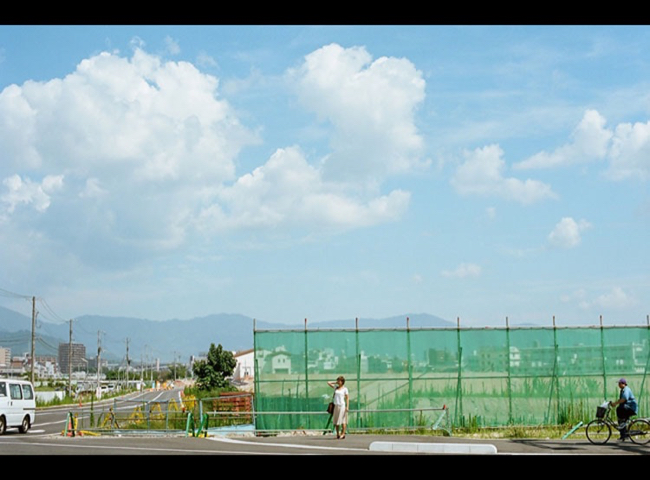August
-
Réalisé par Mieko Azuma • Écrit par Mieko Azuma
-
Japon, Allemagne • 2011 • 84 minutes • HDV • Couleur
- Réalisation :
Mieko Azuma - Écriture :
Mieko Azuma - Image :
Yoshihito Takahashi - Son :
Gerhard Auer, Magnus Pflüger - Montage :
Mieko Azuma - Musique originale :
Berthold Kröker
- Production (structure) :
If... Productions - Ayant droit :
If... Productions
- N° ISAN :
ISAN 0000-0003-3B94-0000-6-0000-0000-J
Résumé
"Un personnage d’écrivain allemande, dont on saura très peu sinon que sa mère perd la mémoire, se rend à Hiroshima pendant la période de la commémoration du bombardement. Guidée par un jeune traducteur japonais, elle rencontre des témoins, des habitants, mais, pas davantage que chez Resnais ou chez Suwa, elle ne parvient à mesurer autre chose que la distance qui la sépare du lieu où elle se trouve et du motif qui l’y a mené. On le voit, à se confronter à telle histoire et à de semblables précédents, l’ambition de Mieko Azuma pour son premier film est grande. Mais si, à l’évidence, cette jeune cinéaste tient remarquablement son pari, c’est qu’elle a su faire s’entrecroiser de manière précise et délicate deux réalités. D’une part, par-delà toute traduction, le constat amer d’un impossible partage : champ et contre champ sont distribués ici sans réversibilité, sans continuité. Une langue ne traduit pas l’autre, encore moins ce qu’elle charrie de l’expérience de son passé et de ses douleurs. D’autre part, le film décrit très sobrement l’existence dans le Hiroshima d’aujourd’hui, qui se poursuit en menant un deuil sans ostentation, effacé, presque invisible. Ainsi abandonne-t-on parfois l’écrivain pour suivre un chauffeur de taxi et son fils, ou le trajet après le travail d’un conducteur de bus. Glissant de façon ténue et bouleversante entre registre documentaire et scènes jouées, Azuma invente une langue cinématographique à elle, pour évoquer à la fois la difficulté à transmettre et la nécessité de jouer des obstacles pour consolider la voie de la mémoire."
(Jean-Pierre Rehm - FID Marseille)
"The character of a German woman writer, about whom we know precious little, apart from the fact that her mother is losing her memory, goes to Hiroshima during the commemoration of the bombing. Guided by a young Japanese translator, she meets witnesses and residents, but just like Resnais or Suwa, she fails to gauge anything other than the distance separating her from the place she finds herself in and from
the motive for going there in the first place. We see here that Meiko Azuma’s ambition for her first film is considerable, as she confronts this story and similar ones made before hers. Yet if, from the evidence before us, we can see that this young film-maker rises to her challenge to a remarkable degree, it is because she succeeds in interweaving two realities in a precise and delicate manner. On the one hand, beyond any translation, there is the bitter acknowledgement of an impossible division: shot and counter shot follow on from each other, irreversible and without any continuity. One language cannot translate into another, particularly when imbued with past experiences and pain. On the other hand, the film soberly describes life in Hiroshima today, which goes on amidst an unostentatious mourning, subdued and almost invisible. We sometimes abandon the writer so as to follow a taxi driver and his son or the journey of a bus driver after his working day. Sliding from
documentary to acted scenes in a disturbing, tenuous way, Azuma invents her own cinematographic language which evokes both the difficulty of transmission and the need to use obstacles in order to reinforce the path of memory."
(Jean-Pierre Rehm - FID Marseille)
Die Schriftstellerin Johanna Schneider (gespielt von Sylvana Krappatsch) recherchiert für eine literarische Reportage über das Gedenken an den Atombombenabwurf. In der Woche um den 6. August, dem Tag der Gedenkzeremonie im "Friedenspark", begegnet sie echten Zeitzeugen, Angehörigen und einfachen Bewohnern der Stadt. Dabei löst sich die Kamera immer wieder von der Protagonistin, um dokumentarisch in das Leben und die Existenz heutiger Bewohner Hiroshimas zu blicken. In der Begegnung deutscher und der japanischer Kultur entsteht ein spannendes Spiel zwischen inszenierten und dokumentarischen Szenen. Eine entscheidende Rolle spielt dabei die unterschiedliche Vergangenheitsbewältigung beider Länder. Johanna Schneider lernt Hiroshima und seine Bewohner kennen und wird dadurch mit ihrem eigenen Land konfrontiert.
Ein Film über die Stadt Hiroshima heute, über die Angst vor dem Vergessen und die Rolle der Erinnerung in der Gegenwart.
Sélections et distinctions
- 2011 • FIDMarseille - Festival International de Cinéma de Marseille • Marseille (France) • Prix Georges de Beauregard International - Mention spéciale
Comment avoir accès au film ?
-
Édition DVD
- Il n'existe pas d'édition DVD à notre connaissance
-
Accès VOD
- Il n'existe pas d'accès en VOD à notre connaissance
- Distribution
- Aide sur les moyens d'accéder à un film
